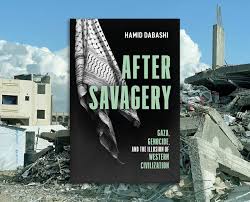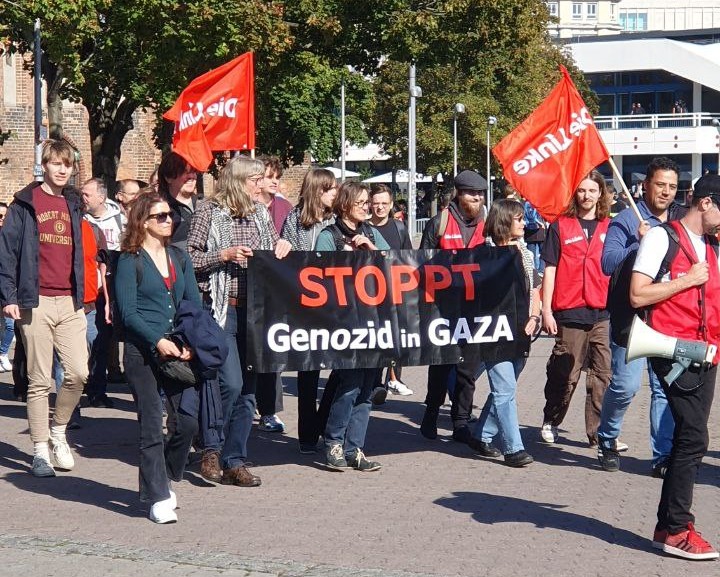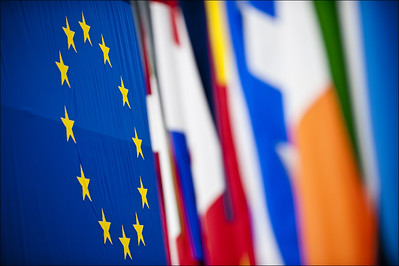Thanks for talking to us. Could you start by briefly introducing yourself?
I’m Julia. I’m originally from Germany, but I moved to the UK a year ago to do a PhD on risky allyship – why people advocate the rights of another group although it might be risky for them and they don’t gain any direct benefits from their activism – indeed, it may even harm them.
Within this project, I’m looking at different groups. And because I’m German, I’m interested in why Germans actively support Palestinians although this can be really hard in Germany and you can be accused of antisemitism as soon as you criticize Israel or say something pro-Palestinian.
In Germany, it’s really hard to find a perspective other than a really pro-Israel narrative.
Why are you specifically interested in Israel and Palestine?
When you grow up in Germany, you hear about the Holocaust a lot in school. You hear much less about the Israel-Palestine conflict apart from media reports about escalations between Israelis and Palestinians without further knowledge of the background of this conflict, and Israel defending themselves against Palestinians.
This meant that when I was a kid I didn’t think much about the conflict. If I thought about it at all, it was as a conflict between two religions. Then I got to know an American Jewish person who had recently moved to Israel. I visited him there, and I heard a lot of the Israeli narrative. I saw soldiers everywhere and how the tension and fear affected people’s daily life. I only heard about this from the Israeli side, but I now felt a personal connection.
Over the years, I became more and more interested in being active for peacebuilding efforts. I did a training to become a peace worker. And the more I learned about the conflict, the more I heard also about the “other” side, the Palestinian side. I also saw how little I knew about how the conflict actually evolved because there is not much discourse about this in German society. I realized that in conflicts such as in Israel and Palestine, it is not enough to just foster positive relations between the groups – the power inequalities and injustices also have to be addressed for sustainable peace efforts.
You’ve lived in Germany and in Britain. What differences have you noticed about how Palestine is discussed?
While I was still in Germany, I saw a lot on social media about Palestinians‘ experiences. I found these emotionally touching. But I didn’t really have people to talk to about it.
Then I moved to the UK. In my project I originally wanted to look at Israelis who support Palestinian rights – people who are part of the conflict, and then step in for the other group and try to empower them, because I imagine it to be very challenging in these contexts to support an oppressed group and as soon as the risk is higher to be an ally, not many people engage in allyship actions. But at some point, I realized how hard it is in Germany to step in for Palestinians – and that it can also be risky there.
When I moved to the UK, I realized how much easier it was to talk openly about the subject. I learned much more about topics like settler colonialism, which were new to me, as they aren’t really addressed in Germany. For me, the German context meant that you always had the fear of saying something wrong about the conflict and not having open discussions about the injustices that are happening there, because of being seen as being antisemitic.
As I’ve been working in academia, I’ve been in a bit of a bubble. In German academia, this is almost a topic that is not covered or talked about, even among more liberal people who are used to talking about inequalities. I would say most research on this conflict focusses on how to create harmony between the groups. I remember one researcher who looked into the differences between criticizing Israel and antisemitism facing a lot of accusations of being antisemitic. This is not the same in the UK, at least for the people I talk to.
Why do you think Germans should feel particularly bad about antisemitism?
From my memory, we spent at least four years at school just talking about World War II and the awful things that we did. I think this is very important to make sure that what has happened will never happen again. My friends and I grew up being taught this guilt towards Jewish people, and feeling bad about our history and what our ancestors did. Overall, I think this makes us feel that we have a higher responsibility compared to other countries to protect Jewish life.
At the same time, there are not that many Jewish people in Germany anymore. Many German people I know say that they’ve never met a Jewish person personally, or at least no-one that they knew was Jewish. So it makes it harder for people to know how to interact with Jewish people appropriately since many hold this guilt and fear to do something wrong in an interaction.
Also, in Germany, Israel is perceived as the representation of all Jewish people and the only way to provide them with a safe environment. It is perceived that we cannot say anything against Israel, because this would be antisemitic, would deny Israelis the right of existence and would be against our responsibility to protect Jewish people. The easiest way for people to show that we‘ve learned from the past and that we are not antisemitic is to openly support Israel. This is much easier than to really look at the still existing problem of antisemitism in Germany. Also, many people do not understand that standing for rights of Palestinians or criticising Israel does not automatically mean that Israelis do not have a right to exist in this area.
I believe that all these things lead Germans to not knowing how to behave or talk about Israel-Palestine because they do not want to say or do anything wrong or inappropriate considering their past, and feel responsible to provide a safe space for Jewish people. However, this is also one of the questions that I am exploring in my interviews and I am happy to hear other opinions about this!
Let’s move onto your project. You have explicitly said that, at least for now, you are not interviewing Israelis and Palestinians. What’s the reasoning behind this?
My project has several parts. The first part is about so-called third parties: people who are not directly part of a conflict. There is a lot of research on collective action: why people fight for their own rights although its risky, e.g., because they have nothing to lose. However, we only know to some extent why people become active allies, and usually research showed that as soon as allyship is risky, people do not engage in allyship actions anymore. So, I am very interested to learn more about what motivates people who become active although they might face risks or barriers, and how they might overcome these barriers. I’m less interested in finding a solution or saying how things should be. I’m more interested in seeing why people fight against human rights violations and injustices; specifically, if its not common in their surroundings.
You’re looking for people who are supporting Palestinians. What does this mean to you? What counts as support?
I tried to have a really low threshold, because I know that it can be difficult in Germany to be vocal. Supporting Palestinians can be being active on social media and posting about injustices that are happening there. It can be giving Palestinians a voice or demonstrating, It can be publicly criticizing Israel.
You’ve done two interviews so far, but do you have any expectations?
First, I want to explore whether the motivations differ between allies who are active in relatively riskless contexts compared to higher-risk contexts. That is the core aim of the project.
Second, because people who are pro-Palestinian don’t really get a voice, we don’t always hear about their motivation. I want to hear about their motivations and about the bigger picture like the difference in power. So, one of the side outcomes of this project will also be to show a more nuanced view of why people get motivated. I also want to show the barriers which prevent people getting involved.
A lot of people are not aware that pro-Palestinian activism can cost you your job, or make you a victim of police violence. Germany is often seen as this really democratic country, and as a role model, but for me it is shocking that for some topics related to human rights people get silenced. This should not happen in a democracy.
Some people will argue that academia should be neutral but what you’re doing seems more like an intervention. How would you answer people who say you’ve made up your mind before you started?
I agree that science should be neutral. At the same time, I think that as a scientist you can never be completely neutral because you’re also a human being with subjective beliefs. Even if you’re creating a questionnaire, it’s you who decides which questions you ask. So, science is never completely objective.
The main question in my research is why people would risk put themselves at risk to support another group. But in Germany, there is virtually no talk about Palestine or Palestinian rights, which creates real barriers which people must overcome before they can become active. This is an objective barrier.
How easy has it been to find people to talk to you? And how are they reacting?
I reached out to a lot of organizations and Facebook groups. But to most people, I’m just an anonymous person and they don’t really know, what the aim of the project is. This can generate scepticism. Some people also say, “Why should we engage with these people from academia?”
But some people I have talked to have said that they’re grateful because no one is looking into this, particularly in German academia. I expected more negative feedback than I’ve actually received.
Suppose I’m a Palestine activist in Germany. I don’t have a lot of time, because Palestine activism is hard work. What would be my motivation to talk to you?
I can completely understand that when you’re active for an important cause, you will spend most of your energy there. I also understand that I’m more interested in the academic question of producing knowledge. This is not necessarily the same thing as activism, but it can be useful for activists. It is important to know who is motivated by what and what are the barriers preventing this. What holds people back from activism?
I’m now at an English university. But my aim is to also somehow publish my results in German. There is not a lot of information about this conflict in the German language. This is one of the barriers which prevents a nuanced debate and any deep discourse. People just don’t have access to different viewpoints.
I don’t want to just use my results and present them as an abstract paper. I also want people to get to know the different reasons why people might be active for Palestinians.
You are trying to talk to people who are supporting Palestinians. Do you think you are personally doing anything to support Palestinians?
This has been a process for me. I wouldn’t say I’m an activist. I started to see the injustices that are happening. And for a long time, I had problem addressing this because of this inner fear of being seen as antisemitic.
Over time, after I read more about the topic, I’ve become more comfortable posting things that address the injustices on social media platforms. What I’m doing now is posting a lot more and talking about the side which isn’t being shown.
What happens next with your project? How long are you interviewing people? When can you expect to publish anything – in English and in German?
I just started with the interviews, and I hope I’ll be done by the end of this year. I need to talk to 15 to 20 more people. After that, the analysis will take some time because the interviews are really long. There’s a lot of rich data. I hope I should have all the results by the middle of next year.
Publishing is a completely different story which takes a really long time. I’m thinking of making my results public in another way outside of academic journals. I’m also involved in a few other projects looking at the motivations of the general German population. It’s different talking about the motivations of people who are active vs. the general public.
If someone does want to talk to you, what sort of person are you looking for?
You have to be over 18. I’m currently searching for third-party, so no Israelis or Palestinians, but also no one from an Israeli or Palestinian family. You should be active in some way, however, already lower levels of engagement/allyship are fine (e.g., social media posts). You must have been born in Germany or lived in Germany for five years. You must understand the German context, and the difficulties of being active in Germany.
If you are interested, you can contact me via email J.Schreiber@sussex.ac.uk or reach out to me on Twitter @schreiber_jul, where you can see more about who I am as a person. At the moment, you cannot really read that much in detail about our project but I’m always happy to talk in more detail if you contact me.
One final question. Do you know what you want to do once you finish your doctorate?
I don’t know exactly. I was never sure whether I wanted to do the PhD in the first place. I came from a place where I really wanted to be more of a peace worker. But I really liked creating knowledge.
I also want to make a difference in the world. I know that academia might not always make a difference because you create knowledge, but often this knowledge stays in academia. So, I can imagine actually going more into peace building in some form, or and building a bridge between this work and academia.
For a long time, I thought that you have to go somewhere where there’s conflict, although I see it slightly different now. There’s also so much conflict happening in Germany. Every injustice is a conflict. Germany is also the context that I’m most familiar with, because I grew up here.
I can see myself working here. But I am aware that what I’m publishing might have negative consequences for me in Germany. But possible negative consequences are not a reason for me to refrain from looking into topics that are related to the injustices in Israel/Palestine and the fight for human rights.




